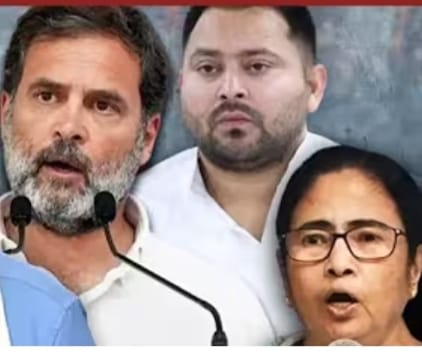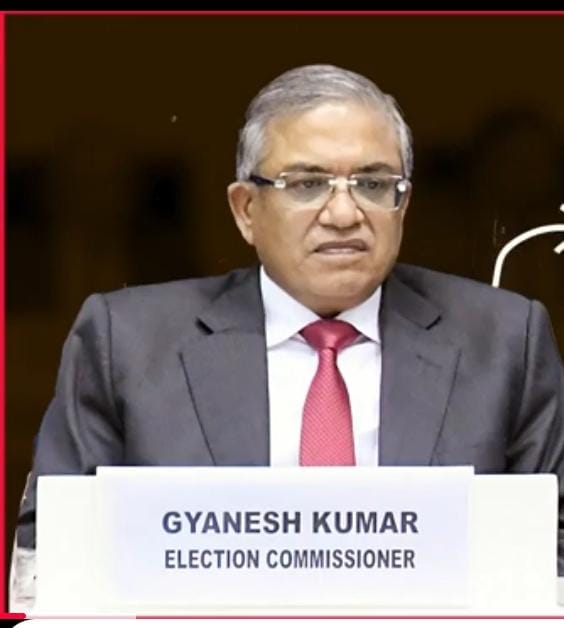

New Delhi: The Election Commission of India’s (ECI) Special Intensive Revision (SIR) of electoral rolls has sparked a fierce national political storm. While officially presented as a routine exercise to cleanse and update the voter list, many in the opposition view it as a calculated political manoeuvre—possibly a dry run to challenge West Bengal Chief Minister Mamata Banerjee in the crucial 2027 Assembly elections.
The controversy escalated sharply after a delegation of opposition leaders was reportedly snubbed by Chief Election Commissioner Gyanesh Kumar and his team in Delhi while attempting to submit a memorandum against the SIR. The ECI’s alleged refusal to engage with the delegation—reportedly limiting the number of representatives allowed—has been described by several senior leaders as “unprecedented,” “vindictive,” and “deeply biased.”
A top legal expert familiar with the inner workings of the ECI called the Commission’s conduct “most disgraceful,” adding that such disregard for democratic norms and opposition representation has never been seen in the institution’s history.
Opposition Sees a Pattern
At the heart of the backlash is the suspicion surrounding the timing, intent, and opaque nature of the SIR rollout—already underway in Bihar. Opposition leaders contend that the exercise is being used as a political tool to arbitrarily delete names from voter lists, selectively modify electoral data, and intimidate segments of the electorate, particularly those supportive of opposition parties.
“This isn’t about voter verification—this is about voter suppression,” charged a senior leader from a prominent regional party. “The government is weaponizing constitutional institutions to tilt the playing field.”
These developments come against the backdrop of growing concerns about the Modi government’s previous moves on voter-related issues. Critics recall the implementation of the National Register of Citizens (NRC) in Assam, where thousands of long-standing residents—many from marginalized communities—were rendered stateless and placed in detention camps despite having legitimate citizenship claims.
SIR: A Nationwide Blueprint?
Sources suggest that the Bihar pilot may only be the beginning. The Modi government reportedly plans to extend the SIR exercise to all states headed for elections over the next two years—including Including West Bengal, Assam ,Tamil Nādu and Kerala apart of UP, Uttarakhand and Punjab, effectively laying the groundwork for a reengineered electoral landscape ahead of the 2029 general elections.
“It’s a strategic exercise to consolidate control over voter rolls, weaken regional parties, and control the democratic narrative,” said a veteran political analyst closely tracking developments within the Election Commission.
While the ECI maintains that the revision falls within its legal mandate and aims to improve the accuracy and inclusivity of the electoral rolls, opposition parties argue that the process is anything but transparent. They raise concerns over the absence of public consultation, lack of uniform guidelines, and potential misuse of data and administrative machinery.
Larger Political Context
Observers note that this electoral move must be seen in the wider context of the Modi government’s current vulnerabilities. India’s declining diplomatic visibility—evident in its marginalisation at international forums like the Shanghai Cooperation Organisation (SCO)—combined with persistent domestic challenges such as economic stagnation, inflation, and agrarian distress, has forced the BJP to re-focus on electoral mechanics.
“This is not just about updating records,” said a former Election Commissioner, requesting anonymity. “It’s about shifting the axis of power through control of electoral inputs. The real casualty here is public trust in the neutrality of democratic institutions.”
Opposition leaders warn that the SIR could lead to widespread voter disenfranchisement—particularly among minorities, Dalits, and migrant workers—under the pretext of data cleansing. Such targeted deletions, they argue, could distort electoral outcomes and deepen public scepticism about the fairness of the upcoming elections.
Trust Deficit in Institutions
The erosion of institutional credibility has become a recurring theme in recent Indian politics. As state after state gears up for elections, the SIR controversy is expected to be a significant flashpoint in the larger battle over democratic integrity.
“There’s a deepening trust deficit. The fear is not just about voter deletions, but about how institutions are being systematically hollowed out,” said an opposition MP from southern India. “If electoral reforms are driven by political agendas, the consequences could be irreversible.”
As the Election Commission faces growing demands for transparency and impartiality, the question remains: is the SIR a legitimate reform, or an elaborate strategy to engineer electoral advantage? Either way, the road to 2027—and beyond—promises to be fraught with tension, legal challenges, and bitter political confrontations.
(Writer is Senior Journalist and Political Commentator)





